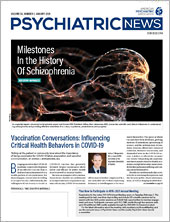Gay couples seeking to adopt children in the foster care system are as fit and capable to be parents as heterosexual couples, and their children are likely to be as healthy and well adjusted as those raised by heterosexual parents.
That’s what APA, the AMA, the American Academy of Pediatrics, and the American Psychological Association told the Supreme Court of the United States in a friend-of-the-court brief filed in a case pitting a religiously affiliated foster care provider against the city of Philadelphia. Oral arguments in the case, Fulton v. Philadelphia, were heard last month; at press time it was uncertain when the court would issue a decision, but it will be before the court’s current term ends on June 28.
“Assertions that heterosexual couples are better parents than same-sex couples, or that the children of lesbian or gay parents fare worse than children of heterosexual parents, are not supported by the cumulative scientific evidence,” the brief states. “Rather, the vast majority of scientific studies that have directly compared these groups have found that gay and lesbian parents are as fit and capable as heterosexual parents and that their children are as psychologically healthy and well adjusted. This holds true for foster care and adoptive sexual minority parents as well.”
The case stems from a suit filed last year by Catholic Social Services, a foster care services provider, against the city of Philadelphia. In 2018, the city learned that Catholic Social Services would not certify same-sex couples as suitable parents for children in the city’s foster care system. The city stopped referring new children to the group, citing a city law prohibiting sexual orientation discrimination (the Fair Practices Ordinance) and updated its 2019 contract with foster care services providers to explicitly forbid such discrimination against potential parents.
Catholic Social Services sued, arguing that Philadelphia’s exclusion of it from the city’s foster care system amounts to religious discrimination, in violation of the First Amendment’s protections for religious exercise.
Two lower courts sided with Philadelphia, citing a 1990 Supreme Court precedent that permits laws affecting religion as long as they are neutral and generally applied.
Catholic Social Services asked the court to overturn that ruling. APA and its fellow petitioners say Philadelphia’s anti-discrimination law should be upheld. “The pertinent scientific and professional literature supports the need for laws like Philadelphia’s Fair Practices Ordinance that prohibit discrimination against sexual minorities in the child welfare system,” they argued in the brief.
Reena Kapoor, M.D., chair of the APA Committee on Judicial Action, said the APA amicus brief continues a history of support for members of sexual minorities.
In 2015 APA supported the plaintiffs in the historic Supreme Court case, Obergefell v. Hodges, that affirmed the right of same-sex marriage. “Scientific evidence strongly supports the conclusion that homosexuality is a normal expression of human sexuality; that gay men and lesbians form stable, committed relationships that are equivalent to heterosexual relationships in essential respects; that same-sex couples are no less fit than heterosexual parents to raise children and their children are no less psychologically healthy and well-adjusted; and that denying same-sex couples access to marriage is both an instance of institutional stigma and a contributor to the negative treatment of lesbian, gay, and bisexual people,” APA and its partners wrote. “In short, the claim that allowing same-sex couples to marry undermines the institution of marriage and harms children is inconsistent with the scientific evidence.”
In Fulton v. Philadelphia, Kapoor said there were two essential points the brief sought to bring before the court: that discrimination against sexual minorities has harmful mental health effects, and that there is no scientific basis for asserting that gay couples cannot be excellent parents or that their children are any less psychologically healthy than children of heterosexual couples.
“For decades it has been clear that homosexuality is not a mental illness and that people who have same-sex attraction should have the same rights as anyone else, including the right to adopt children,” Kapoor said. “It is important for us as an organization to express those opinions in a venue where it really matters. Historically, our opinions have had an impact on decisions of the United States Supreme Court.” ■

